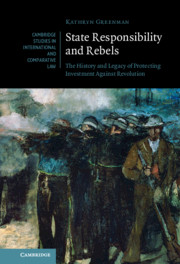Book contents
- State Responsibility and Rebels
- Cambridge Studies in International and Comparative Law
- State Responsibility and Rebels
- Copyright page
- Contents
- Acknowledgements
- Table of Cases
- 1 The Past and Present of State Responsibility for Rebels
- 2 The System: Mixed Claims Commissions in the Shadow of Empire
- 3 The Cases: Autonomy, Ambiguity and Doctrine in the Work of the Commissions
- 4 The Scholarship: Resistance and Development
- 5 The Codification Projects: Stalemate
- 6 The Legacy: Protecting Investment against Revolution in the Decolonised World
- Bibliography
- Index
- Cambridge Studies in International and Comparative Law
4 - The Scholarship: Resistance and Development
Published online by Cambridge University Press: 13 August 2021
- State Responsibility and Rebels
- Cambridge Studies in International and Comparative Law
- State Responsibility and Rebels
- Copyright page
- Contents
- Acknowledgements
- Table of Cases
- 1 The Past and Present of State Responsibility for Rebels
- 2 The System: Mixed Claims Commissions in the Shadow of Empire
- 3 The Cases: Autonomy, Ambiguity and Doctrine in the Work of the Commissions
- 4 The Scholarship: Resistance and Development
- 5 The Codification Projects: Stalemate
- 6 The Legacy: Protecting Investment against Revolution in the Decolonised World
- Bibliography
- Index
- Cambridge Studies in International and Comparative Law
Summary
The first moves to develop rules of state responsibility for rebels were made by Latin American international lawyers who sought to resist intervention on the basis of enforcing revolutionary damage claims. Later, Anglo-American international lawyers sought to reconcile rules from the arbitral practice, rules that often justified intervention and reinforced the legal impact of intervention. This was something that took a lot of interpretive work given how inconsistent and unstable the practice was. This dynamic of resistance and development – a battle over the meaning and authority of the arbitral practice – drove the emergence of state responsibility for rebels as a flourishing, if disputed, sub-field of international law.While nearly all the various positions made responsibility for rebels the exception rather than the rule, Latin American international lawyers tended towards narrow exceptions defined by reference to national treatment. Anglo-Americans, in contrast, based expansive exceptions on an international standard of alien protection. These debates can be understood as a struggle over the internationalisation of protection against rebels, structured around questions of whether the standard of protection against rebels owed by states to aliens was nationally or internationally determined and whether it was domestic or international authority that adjudicated such standard.
- Type
- Chapter
- Information
- State Responsibility and RebelsThe History and Legacy of Protecting Investment Against Revolution, pp. 109 - 141Publisher: Cambridge University PressPrint publication year: 2021



